Niacinamide And Vitamin C Derivatives
When it comes to mixing actives, it can be confusing when you are trying to build a skincare routine to address multiple skin concerns. Both niacinamide and vitamin C are potent skincare ingredients that provide many benefits for your skin. But you may have heard that you shouldn't use niacinamide and vitamin C together.
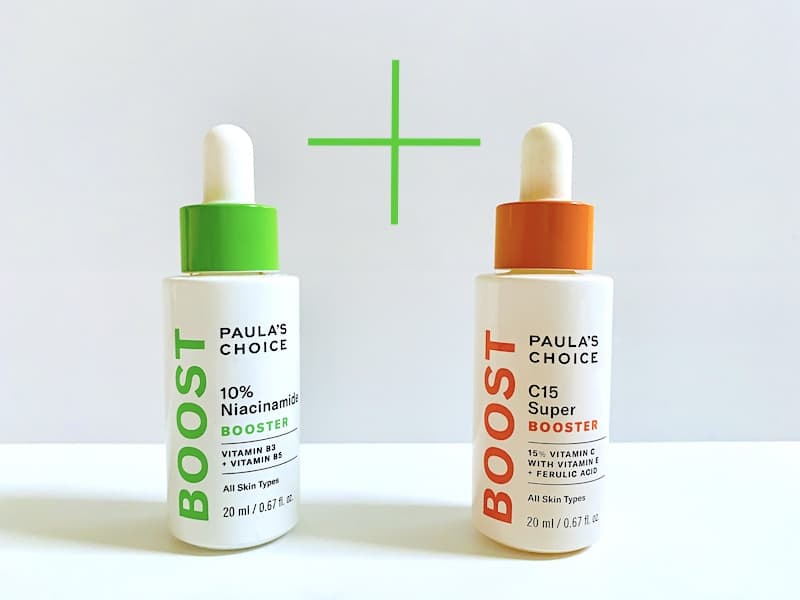
So, can you use niacinamide with vitamin C? The answer is YES! But before we discuss using niacinamide and vitamin C together, let's take a look at why you might want to add them into your skincare routine in the first place.
This post contains affiliate links, and any purchases made through these links will result in a commission for me at no extra cost to you. Please read my Disclosure for additional information.
The Benefits of Vitamin C
Vitamin C , also known as ascorbic acid, offers many benefits for the body, including the skin. Vitamin C has three main benefits for the skin.
- Vitamin C is a potent antioxidant and protects skin from photodamage caused by free radicals due to UV exposure. This cellular damage can lead to premature aging of the skin, including fine lines and wrinkles. Vitamin C can improve wrinkles and skin texture changes of photodamaged skin, as demonstrated by this study . Also, applying a vitamin C product in your morning skincare routine before sunscreen helps protect your skin from harmful UV rays.
- Vitamin C stimulates collagen production, which results in firmer, smoother, and more youthful-looking skin.
- Vitamin C helps to fade hyperpigmentation, dark spots, and improve uneven skin tone. Vitamin C inhibits tyrosinase , an enzyme involved in melanin formation. Melanin is the pigment in our skin that gives it color.
With all of these benefits come some drawbacks. Vitamin C is unstable and prone to oxidation when exposed to air, heat, and light. These elements break vitamin C down and reduce its effectiveness, causing it to turn brown.
Vitamin C may also be irritating at higher concentrations. If you have sensitive skin or wish to avoid potential sensitivity from pure vitamin C, look for formulas with lower ascorbic acid concentrations or use a vitamin C derivative.
As an alternative to pure vitamin C, there are several vitamin C derivatives available in skincare products that are not only stable and non-irritating but also offer many of the same benefits as pure vitamin C. These derivatives may not be as potent as pure vitamin C, but they don't negatively interact with niacinamide.
Vitamin C derivatives include sodium ascorbyl phosphate, magnesium ascorbyl phosphate, ascorbyl glucoside, tetrahexyldecyl ascorbate, ascorbyl tetraisopalmitate, and 3-O-ethyl ascorbic acid.
The Benefits of Niacinamide
Like Vitamin C, niacinamide (vitamin B-3) is an all-star skincare active, as it offers multiple benefits for the skin (and some of the same benefits of vitamin C) without many of the side effects of stronger actives like retinol and glycolic acid .
- Niacinamide increases ceramide synthesis and decreases transepidermal water loss in dry skin. This helps repair and strengthen the skin barrier, a natural moisture barrier that keeps hydration and moisture in and environmental stressors out.
- Niacinamide stimulates the production of collagen and specific proteins that can help skin appear firmer and more youthful-looking.
- Niacinamide fades hyperpigmentation and dark spots, improves uneven skin tone, and can even treat melasma. Niacinamide reduces the transfer of melanosomes (organelles that produce pigment) with fewer side effects than skin-lightening hydroquinone.
- Niacinamide is also beneficial for those with oily and acne-prone skin, as it can balance sebum (oil) production and has anti-inflammatory properties . Research has shown that niacinamide in the form of 4% nicotinamide gel has comparable effectiveness to 1% clindamycin gel in the treatment of acne.
Related Post: The Best Kiehl's Products
Can Niacinamide and Vitamin C Be Used Together at the Same Time?
YES! If you Google whether you can use niacinamide and vitamin C (ascorbic acid) together, you may read that they should not be used together. I did some research to get to the bottom of why some say these two actives can't be used simultaneously.
The concern about combining niacinamide and vitamin C is that their effectiveness may be decreased. By combining them, a reaction may occur that will turn niacinamide into nicotinic acid (niacin), which may result in redness and flushing in the skin caused by epidermal Langerhans cells.
Research that found that niacinamide and vitamin c should not be used together dates back to the 1960s, so it's a bit outdated to begin with. It turns out that an issue occurs only when niacinamide and vitamin C are mixed at high temperatures for an extended time period. Realistically, this shouldn't happen to your skincare products if you store them at room temperature.
The other concern is that when niacinamide and vitamin C are mixed, they turn yellow, which makes you think that they might cancel each other out, making them ineffective. Remember that vitamin C turns darker orange/brown when it oxidizes and becomes less effective.
When niacinamide and vitamin C are mixed at a pH close to 3.8, some of their molecules form a complex called niacinamide ascorbate. As niacinamide ascorbate moves deeper into our skin, it starts separating back into niacinamide and ascorbic acid, and each ingredient continues to offer its original benefits for the skin.
Even when mixed, niacinamide ascorbate has its own benefits. This study
found that niacinamide ascorbate can reduce pigment formation of skin exposed to solar simulated radiation.
So these two concerns, (1) the creation of niacin and (2) the decrease in efficacy of both niacinamide and vitamin C, should not be an issue when using these two skincare products under normal circumstances.
Alternatives to Using Niacinamide and Vitamin C Together
If you are still reluctant to use niacinamide and vitamin C together, you can alternate usage, such as applying vitamin C during the day and niacinamide in the evening.
Or you can use a vitamin C derivative with niacinamide, which does not interact with niacinamide in the same way as pure ascorbic acid would.
Related Post: Can You Use Niacinamide with Retinol?
Niacinamide and Vitamin C Serums
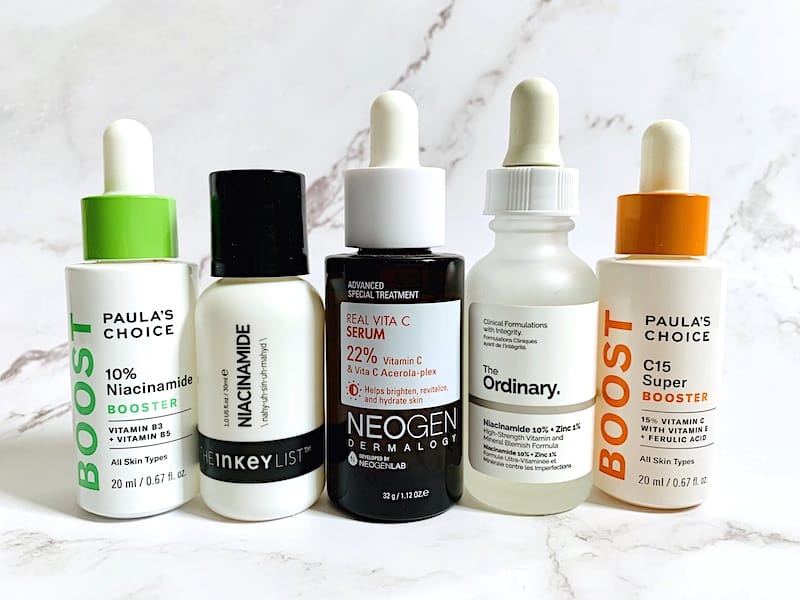
Neogen Dermalogy Real Vita C Serum
2-in-1 Vitamin C (Derivative) + Niacinamide Serum
You don't have to worry about mixing pure vitamin C and niacinamide with this serum since it contains a vitamin C derivative. This niacinamide and vitamin C derivative serum from Neogen Dermalogy combines two products in one.
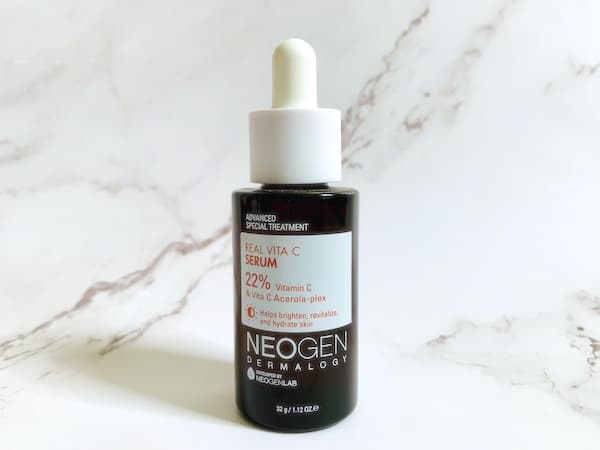
Neogen Dermalogy Real Vita C Serum combines a 22% concentration of a vitamin C derivative and niacinamide to brighten skin tone and reduce the look of photodamage, hyperpigmentation, and dark spots.
The vitamin C derivative is sodium ascorbyl phosphate, a light and oxygen stable form of vitamin C. This derivative offers similar benefits as pure vitamin C (ascorbic acid): it provides antioxidant protection, boosts collagen synthesis, brightens dull skin, and fades discoloration. This study found that it can even prevent and treat acne without side effects.
The concentration of niacinamide is not disclosed, but niacinamide has the 5th highest concentration of all 31 ingredients. As previously noted, niacinamide offers several benefits for the skin, including strengthening the skin barrier, balancing sebum production, improving skin firmness and elasticity, and brightening the skin.
Please note if you have sensitive skin, there are fragrance and citrus fruit extracts (lemon extract, lime extract, orange extract, grapefruit extract, and tangerine extract) in this serum, which are included to brighten and revitalize the skin.
Vitamin E and panthenol soothe and moisturize the skin. Sodium hyaluronate, the salt form of hyaluronic acid, hydrates and attracts moisture to the skin.
Paula's Choice C15 Super Booster
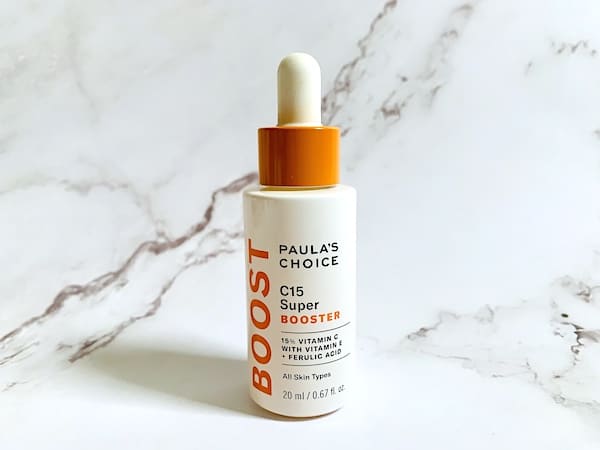
For a pure form of vitamin C, Paula's Choice C15 Super Booster contains 15% ascorbic acid (pure vitamin C) and antioxidants vitamin E and ferulic acid to improve stability and boost the photoprotection effectiveness of vitamin C.
The serum also contains sodium hyaluronate to hydrate, glycerin to moisturize, and panthenol and bisabolol to soothe the skin. Hexanoyl dipeptide-3 norleucine acetate is a tripeptide that smoothes and hydrates the skin.
This serum has an ultralightweight consistency, almost that of water, so you can easily incorporate it into your skincare routine under or mixed in with other serums and moisturizers. It works as a potent anti-ager to help reduce the look of wrinkles and fine lines, brighten dull skin and offer antioxidant protection.
Related Post: Can You Use Glycolic Acid and Vitamin C Together?
Paula's Choice 10% Niacinamide Booster
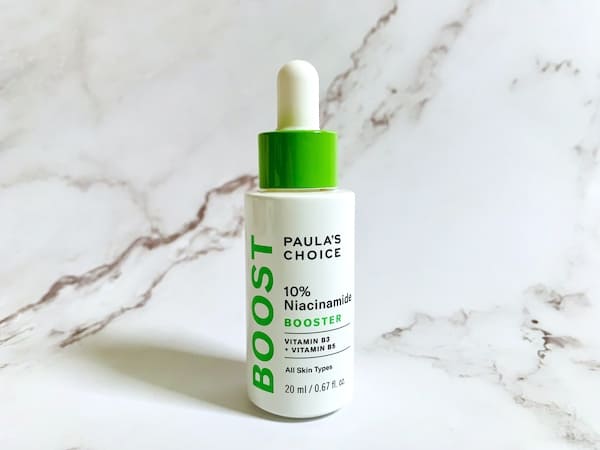
Another serum that contains niacinamide and a vitamin C derivative is
Paula's Choice 10% Niacinamide Booster . This multi-tasking serum contains 10% niacinamide to brighten your complexion, improve the look of enlarged pores, skin texture, uneven skin tone, rough skin, redness, dryness, and fine lines.
The serum contains ascorbyl glucoside, a stable and effective vitamin C derivative that provides protective antioxidant benefits, fades dark spots, and increases collagen production.
The serum contains several other antioxidants like ubiquinone, epigallocatechin gallate, beta-glucan, carnosine and genistein. Plants extracts include Glycyrrhiza glabra (licorice) root extract, which brightens and soothes the skin. Glycerin and sodium hyaluronate hydrate and moisturize the skin. Panthenol (pro-vitamin B5) soothes and moisturizes the skin.
Like Paula Choice's C15 Vitamin C Super Booster, this serum is featherlight and feels almost like water when applied to your skin. This makes it the ideal serum for use during the day under makeup, sunscreen, and other skincare products.
Related Posts: Can You Use Niacinamide with Hyaluronic Acid? , Can You Use Azelaic Acid and Niacinamide Together?
The Inkey List Niacinamide Serum
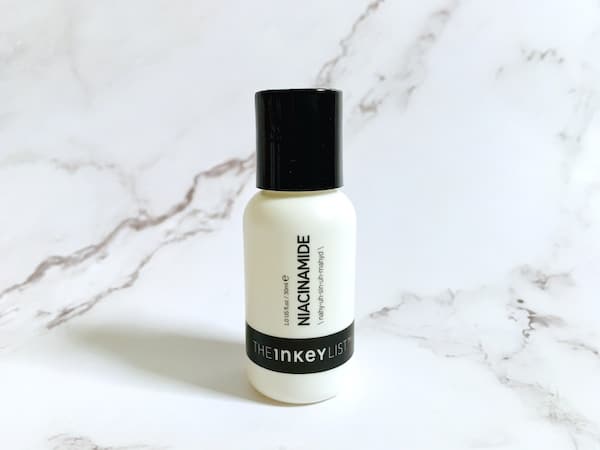
The Inkey List Niacinamide Serum is a 10% niacinamide serum that combats excess oil, blemishes, and redness. It also contains a 1% hyaluronic acid solution to hydrate and attract moisture to the skin. Glycerin and squalane moisturize the skin. Allantoin and panthenol soothe the skin.
A little thicker than some of the watery niacinamide serums, this serum does wonders for breakouts and redness. It also controls sebum production and supports a healthy skin barrier, all at a very affordable price.
The Ordinary Niacinamide 10% + Zinc 1%
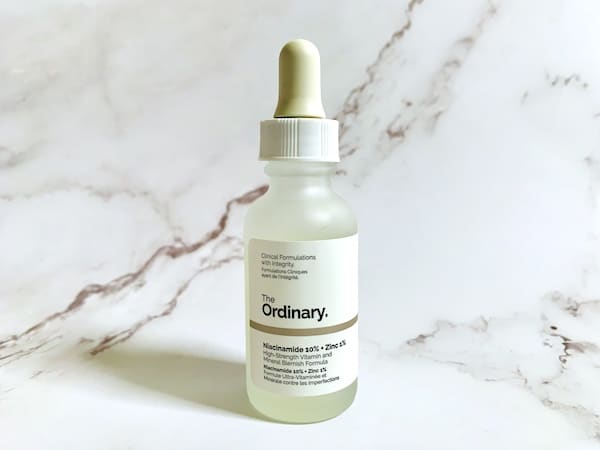
The Ordinary Niacinamide 10% + Zinc 1% contains 10% niacinamide and 1% Zinc PCA (zinc salt of pyrrolidone carboxylic acid) to target blemishes and balance sebum production. This best-selling niacinamide serum is affordable and effective at brightening the skin and fading hyperpigmentation and uneven skin tone.
This The Ordinary serum is a favorite of those with oily and acne prone skin. It helps reduce the look of acne and redness and controls oil, too.
Related Post: The Ordinary "B" Oil Review
Final Thoughts on Using Niacinamide with Vitamin C
Regardless of how you choose to use niacinamide and vitamin C, both actives are very effective for brightening dull skin and helping to reduce hyperpigmentation and dark spots. They are also both effective anti-agers by targeting wrinkles and fine lines and improving skin firmness.
Concerns about using them at the same time are outdated and unfounded, so use them together to see double the anti-aging and brightening benefits!
Thanks for reading, and until next time, here's to your good skin health!
Related Posts: Can You Use Salicylic Acid with Niacinamide? , Can You Use Hyaluronic Acid with Vitamin C?
Niacinamide And Vitamin C Derivatives
Source: https://theskincareenthusiast.com/can-you-use-niacinamide-with-vitamin-c/

0 komentar:
Posting Komentar